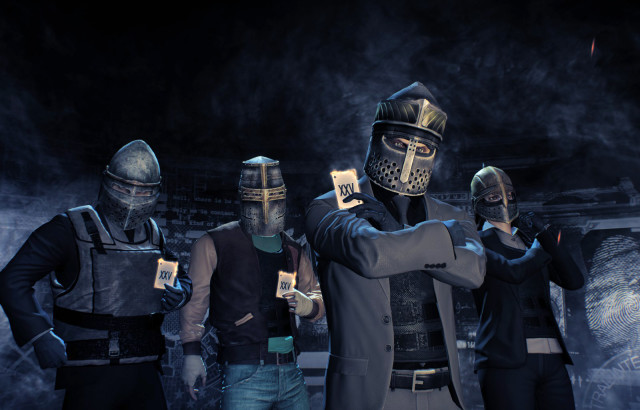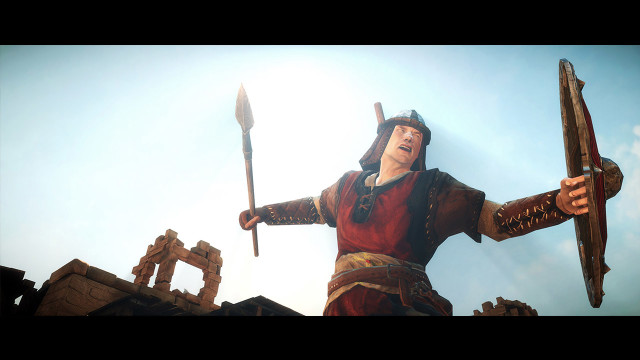Torn Banner Studios lets players armor up and get medieval with games like Chivalry: Medieval Warfare. In it, players use swords, shields and longbows to siege castles, raid villages and fight each other for wealth and glory. Its popularity has grown, thanks to some key partnerships and cross-promotions with popular games like Payday 2 and Rocket League.
Alex Hayter, Torn Banner Studios Senior Brand Manager, will speak at this year’s GDC about creating and maintaining these cross-promotional partnerships in “Collaboration, Not Competition: Growing Your Community Through Studio Partnerships.” But first, he takes some time to talk to [a]listdaily about some of the past promotions, and the finer details of using medieval weaponry in the modern age.
 What have been some of the best cross-promotions?
What have been some of the best cross-promotions?
Torn Banner has done various kinds of cross-promotions between Chivalry: Medieval Warfare and other games such as Killing Floor 2, Payday 2, Rocket League, Depth, Natural Selection 2 and more! They’ve all been great in their own ways. The Killing Floor 2 and Payday 2 cross-promos are perhaps the most exciting because of the amount of new in-game content that both of those involved.
With Killing Floor 2, we added several new weapons and helmets to Chivalry that were inspired by Killing Floor‘s horrific zombie world; and to their game they added an entirely new playable character called Tom Banner (the Chivalry Knight). Likewise with Payday 2, we added some awesome Payday-inspired grinning masks to Chivalry and their studio created a full-blown DLC pack called The Chivalry Gage Pack. So, those really resonated with our players and we had a great time making the content.
Everything’s relative to the amount of work put in. Even the smaller cross-promotional activity we’ve engaged in with our fellow studios has been great. We’ve done fan art crossover contests, social media shout outs and really simple in-game content updates – like the Agatha and Mason team flags from Chivalry being put into Rocket League in exchange for similar decorations going into our game. Sometimes the simple stuff is just as much fun.
What are some of the other methods you’ve explored to promote your games?
A lot of our marketing is geared around major patches and/or sales. Last year we tied Chivalry‘s Free Weekends on Steam to special events. “Community Fest” in May 2015 patched in a ton of community-made content (maps, weapons, armor) and some unique community perks. The “Peasants’ Revolt” in October 2015 allowed players to temporarily dress up as a peasant and gain access to a selection of peasant-themed weapons, including a pick axe and wooden sword.
The Chivalry Steam Community has been another valuable resource for promoting additional Chivalry content to existing players, while building a community of Torn Banner fans that will be (hopefully) interested in whatever future games we make. This past year we grew our Steam Community from 40,000 to almost 200,000 members using a variety of in-game rewards to incentivize people to join it.
Video content creator relations have also been critical for Chivalry’s success and really form the backbone of our outreach. Every time a new YouTube video goes up of someone playing Chivalry (over a certain viewer count) I get in touch with the creator to thank them personally and try to build a relationship. That might lead to key giveaways, new content for the videos, etc. More often than not, this leads to more videos of our games from that person and builds a connection with someone who’s genuinely interested in talking to us about our games.

In what ways have you seen awareness of Torn Banner games grow thanks to these partnerships?
Our cross-promos have had the huge benefit of our games being exposed to the entire audience of another game. In some cases, hundreds of thousands of currently active players. We’ve seen the direct results of strong sales during the launch period of these cross-promotions, as well as the long term benefit of players of games like Killing Floor 2 buying Chivalry so that they can access new content. Likewise, our partners reap the same rewards and our communities get fun new content to play around with.
Do cross-over partnerships work as well for console releases as they do on PC?
We haven’t brought any in-game cross-promo content updates to Chivalry on Xbox 360, Xbox One, PS3 and PS4 because patching is separate to the Steam version of our game. However, when it comes to community the audiences have a lot of overlap thanks to social media and our forums – meaning that any of the smaller cross-promotions (community contests, etc.) we’ve done have helped generate excitement for those players on console too. I can see cross-promotions working well for any cross-platform titles because of this.

What is your approach toward finding a partner and finding a cross-promotion plan that fits?
I’ll be getting into the nitty gritty of this in the GDC talk. In a nutshell though… First we have a strategy for figuring out what partners to work with. This is based both on data (sales and player stats) and just generally looking at who we’d be excited to work with and would be a suitable fit for our game. Then we figure out what “weight” category of cross-promotion we’d like to pursue with them – into which we categorize types of cross-promotional activity (e.g. social media, contests, joint sales, in-game texture work, in-game 3D work, etc). Then we simply get in touch and try to go from there.
Have you found that developers are usually open to the idea of cross-promotion?
Definitely. In our case we have a successful game with a decent audience, so people we’ve reached out to have generally been interested. But I think developers of all sizes have much to offer one another in terms of getting their communities excited about each others’ games. A smaller, more “indie” title with a few thousand total sales might be attracting the exact audience that a game of a similar size and scope would love to appeal to grow their community.
What is the most important thing to keep in mind when forming a promotional partnership?
Make sure you can commit to what you’re offering your partners!
This is where, I hope, the advice in this GDC talk will come in handy. It’s important to put a lot of thought into what sorts of new content your team is able to create. Sometimes the only viable option for a given cross-promotion is for only one person at your studio to work on a lot of stuff themselves.
For a smaller studio with a limited amount of people and resources, this has meant we’ve had to take a careful approach to not overloading ourselves with the opportunities presented by a potential relationship with another studio, so that we still can retain our time (and sanity) to work on our primary game development. Cross-promotions can be an incredibly valuable initiative to complement your game’s typical content updates, and a way to excite your community and use another studio’s game as a marketing platform, but it’s important to know the limits of what’s possible.

